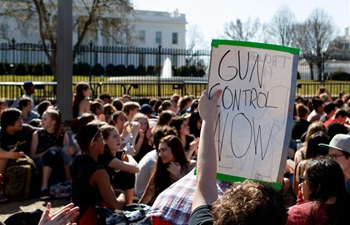NEW YORK, Feb. 21 (Xinhua) -- A woman living alone in New York is crediting FaceTime, Apple's videotelephony product, with saving her life after her sister noticed stroke symptoms during a FaceTime video call, local media reported.
Opokua Kwapong's speech was slurred and her face drooped during the video call made through an iPhone, her sister said.
"When I called Opokua, she said that she'd not been feeling well and had been feeling tired and was also having some difficulty walking," her sister Adumea Sapong told BBC.
"She tried to pick up a glass of water and wasn't able to. Then I noticed on the FaceTime video call that her face was drooping," Sapong added.
Kwapong didn't believe her sister until another relative, who is a doctor, was also called through FaceTime and told Kwapong to call for help straightaway.
Kwapong was sent to hospital after dialling 911, and doctors found a clot on her brain that had caused the stroke.
Although Kwapong's left side was paralyzed, she thinks FaceTime "saved" her life.
"If my sister had not noticed that something was not right, then things could have been so different," she said.
Now Kwapong is relying on video conference technology to continue working as a food scientist.
A drooping face, weakness in the arms and speech slurring are the three warning signs of stroke and an early response should be made accordingly.
Dr. May Nour, medical director of the University of California, Los Angeles, told Xinhua that rapid response is critical "because the sooner a stroke is treated, the better the patient's outcome."
According to statistics from the U.S. Centers for Disease Control and Prevention, strokes kill about 140,000 Americans each year, accounting for one out of every 20 deaths.













